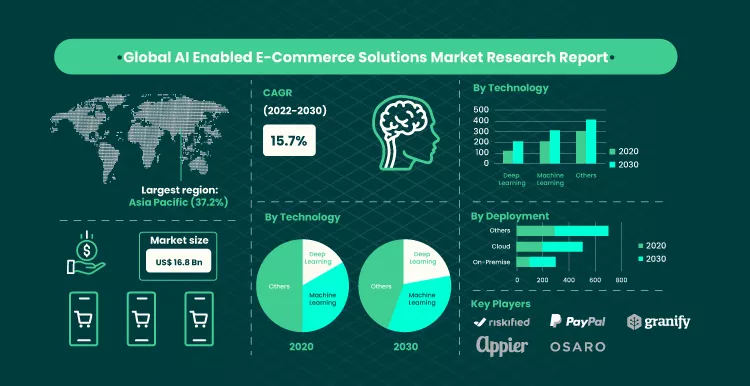Artificial intelligence has emerged as a game-changer across various industries in recent years, and eCommerce is no exception. The widespread adoption of AI technology is reshaping the landscape of online shopping, ushering in a new era of efficiency, personalization, and innovation.

- Transformational Power of AI: AI has swiftly gained popularity due to its transformative capabilities. From enhancing operational efficiency to revolutionizing customer experiences, AI is driving significant advancements in eCommerce. It allows businesses to analyze vast amounts of data, automate routine tasks, and deliver personalized recommendations, leading to improved sales and customer satisfaction.
- Forecasted Dominance by 2025: AI’s impact on customer interactions is projected to be monumental. Experts predict that by 2025, AI would power a staggering 95% of customer interactions in the eCommerce domain. This forecast underscores the pivotal role AI is poised to play in shaping the future of online retail, making its integration imperative for eCommerce businesses looking to stay competitive in the market.
- Non-Negotiable Need for eCommerce Businesses: For eCommerce business owners, embracing AI is no longer an option but a necessity for survival and success in the digital marketplace. To be relevant and thrive in an increasingly competitive landscape, businesses must harness the power of AI-driven solutions. Whether it’s optimizing product recommendations, streamlining logistics, or personalizing marketing campaigns, AI offers many opportunities for eCommerce businesses to gain a competitive edge.
- Bold Steps Toward Transformation: Embracing AI-driven technologies requires eCommerce businesses to take bold steps toward transformation. This entails investing in AI-powered tools and solutions, cultivating a data-driven culture, and embracing innovation at every level of the organization. By leveraging AI effectively, businesses can unlock new growth opportunities, enhance operational efficiency, and deliver unparalleled customer experiences.
Different Ways of Using AI in Ecommerce:
1. Hyper-Personalized Recommendations

Traditional personalization, like addressing customers by their first name in emails, lays the groundwork for customer engagement. However, hyper-personalization takes this concept to an entirely new level, leveraging advanced technologies such as AI, ML, and the Internet of Things to create tailored experiences for each customer.
Hyper-personalization harnesses the power of AI and ML to analyze vast volumes of customer data, including browsing history, purchase behavior, interactions, and preferences. This enables eCommerce platforms like Amazon to generate highly accurate product recommendations customized to customers’ unique interests and needs. These recommendations go beyond simple suggestions, presenting products that align closely with individual preferences, increasing the likelihood of conversion.
Tools of Hyper-Personalization Engines:
- YouChoose: Personalization platform leveraging AI to deliver tailored product recommendations and enhance user experiences.
- Recolize: AI-driven recommendation engine that analyzes user behavior to provide personalized product suggestions and boost conversions.
- Kibo: Comprehensive eCommerce platform with advanced personalization features to optimize customer journeys and drive sales.
- Unbx: AI-powered eCommerce solution that delivers hyper-personalized shopping experiences through targeted product recommendations and dynamic content.
Learn about conversational marketing here.
2. Understanding Hyper-Targeted Marketing Campaigns

Hyper-targeted marketing campaigns leverage AI-driven algorithms to analyze consumer behavior, preferences, and interactions, enabling brands to deliver highly personalized content, product recommendations, incentives, and communication channels tailored to customers. By utilizing machine learning algorithms, hyper-targeted marketing campaigns achieve precise segmentation, allowing brands to deliver the right message to customers at the right time. This level of customization enhances engagement and drives conversions by providing relevant content and offers that resonate with individual preferences.
Tools of Hyper-Targeted Marketing:
- Albert: Employs AI for personalization and predictive segmentation.
- AgilOne: Provides a customer data platform for building AI models to predict behaviors.
- Triblio: Leverages AI for account-based marketing and personalized campaigns.
- Persado: Generates AI-driven messaging tailored to resonate with each customer emotionally.
- Crayon: Utilizes machine learning to create and optimize hyper-targeted campaigns rapidly.
3. Automated Inventory Management

In today’s fast-paced business landscape, automated inventory management systems represent a quantum leap in streamlining operations and optimizing resources. These advanced systems, driven by cutting-edge machine learning algorithms like InventoryBox, revolutionize how businesses handle inventory. By leveraging sophisticated data analytics, these platforms accurately forecast demand, identify consumption trends, and pinpoint dead stock. Moreover, they intelligently recommend optimal inventory levels for every product, ensuring a delicate balance between supply and demand.
One of the key advantages of these automated systems is their ability to seamlessly integrate with robotics technology, such as the innovative robots offered by 6 River Systems. These robots automate the process of reordering inventory, eliminating the need for manual intervention and significantly reducing the risk of overstocking or stockouts. Additionally, platforms like Lokad and Brightpearl harness the power of data science to refine inventory planning processes and minimize waste. Automating inventory management tasks allows businesses to operate with leaner inventories, optimize capital allocation, and enhance overall operational efficiency.
Tools for Automated Inventory Management:
- Lokad: This utilizes probabilistic forecasting techniques to predict demand variability and optimize inventory stocking decisions, minimizing stockouts and reducing excess inventory.
- Brightpearl: It provides a comprehensive suite of inventory planning and replenishment tools, empowering businesses to make data-driven decisions to drive growth and profitability.
- 6 River Systems: It streamlines inventory replenishment processes, eliminating manual errors and ensuring optimal stock levels.
4. Lifetime Customer Value Prediction

Understanding the lifetime value of customers is paramount for businesses seeking sustainable growth and profitability. With the advent of AI-powered tools like Customer.io, accurately predicting customer lifetime value has become more attainable. These sophisticated platforms leverage advanced algorithms to analyze vast troves of historical data, including spending patterns and behavioral insights, to forecast the potential lifetime value of each customer. With this invaluable information, businesses can tailor their marketing strategies, personalize customer interactions, and allocate resources effectively to maximize customer lifetime value.
Tools for Lifetime Customer Value Prediction:
- Customer.io: Customer.io employs advanced predictive analytics to forecast potential lifetime customer value, enabling businesses to segment their customer base and tailor the marketing strategies accordingly.
6. Enhanced Site Search

In the era of digital commerce, providing a seamless and intuitive search experience is essential for driving user engagement and conversions. AI-driven search tools, exemplified by leading platforms like Algolia, have emerged as game-changers. Leveraging advanced machine learning algorithms, these tools analyze user behavior data to understand search intent and deliver highly relevant search results in real time. Moreover, they offer a host of advanced features such as autocomplete suggestions, spell-checking, and dynamic result refinement, enhancing the overall search experience for users. Additionally, with the growing prevalence of voice search, optimizing site search for voice queries has become imperative for businesses looking to stay ahead of the curve.
Tools for Enhanced Site Search:
- Algolia: Algolia delivers highly relevant and personalized search results to users, leveraging advanced machine learning algorithms to create a frictionless search experience that drives engagement and boosts sales.
- Lucidworks Fusion: It offers powerful search capabilities. It enables businesses to deliver fast and accurate search results that match user intent, enhancing the overall user experience.
- Attivio Cognitive Search: This tool utilizes artificial intelligence to analyze user search queries and behavior, providing intuitive search experiences that improve user engagement and satisfaction.
- Cove: It enhances site search functionality with advanced features such as autocomplete suggestions and faceted search, empowering businesses to create seamless customer search experiences.
7. Automated Lead Scoring
Effective lead management is vital for successful sales operations, and AI-powered lead-scoring tools are revolutionizing how businesses identify and prioritize potential customers. These advanced platforms utilize sophisticated algorithms to analyze a myriad of factors, including demographic data, past interactions, and website activity, to assign a score to each lead based on their likelihood of conversion.
Tools for Automated Lead Scoring:
- Leadfeeder: It automates lead scoring by analyzing website visitor data and identifying prospects with the highest likelihood of conversion. This enables sales teams to prioritize leads effectively and drive revenue growth.
- Ironscales: This uses predictive analytics to determine lead readiness and recommend actions for sales reps, streamlining the lead qualification process and improving sales efficiency.
- Salesloft: It leverages artificial intelligence and machine learning to optimize outbound engagement and prioritize leads, enabling sales teams to maximize their effectiveness and drive revenue.
Conclusion:
Artificial Intelligence (AI) has become an indispensable tool in eCommerce, revolutionizing the way businesses interact with customers and manage operations. Through advanced algorithms and machine learning techniques, AI enables eCommerce platforms to offer personalized experiences, optimize processes, and drive growth. From hyper-personalized recommendations to automated inventory management, AI empowers businesses to stay competitive in today’s dynamic market landscape.
FAQs on AI and Ecommerce:
Can AI help eCommerce businesses improve sales and conversions?
Yes, AI-powered tools can analyze customer behavior, predict purchasing patterns, and tailor marketing strategies to target high-value customers, leading to increased sales and conversions.
How does AI impact fraud prevention in eCommerce?
AI algorithms can detect fraudulent activities by analyzing transaction data, identifying patterns indicative of fraud, and flagging suspicious transactions in real time, thereby reducing the risk of financial losses for eCommerce businesses.
Are there any ethical considerations or risks associated with the widespread adoption of AI in eCommerce?
While AI offers numerous benefits to eCommerce businesses, there are ethical concerns related to data privacy, algorithm bias, job displacement, and reliance on automated decision-making processes. It is essential for eCommerce companies to prioritize transparency, fairness, and accountability when implementing AI technologies to mitigate potential risks and ensure ethical AI practices.



